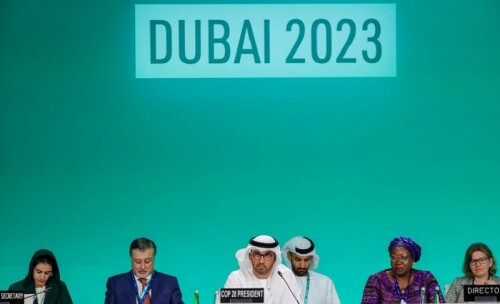Caretaker Prime Minister Anwaarul Haq Kakar on Saturday called for immediately executing the US$100 billion in commitments for climate finance to ensure the implementation of climate change actions by developing countries and mitigate the climate change impacts.
Delivering his National Statement at the 28th Conference of Parties of the United Nations (COP28) in Dubai, PM Kakar said that such financing “should not be at the cost of development finance nor add to the already high debt burden of the developing countries”.
He also called upon the developed countries to take the lead in raising global mitigation ambition commensurate with their economic standing and historical responsibility, and then help developing countries do the same.
“We need to achieve global resilience through delivering an ambitious outcome in the form of a framework for global goal on adaptation with clear targets and indicators including regular monitoring of progress,” he said adding that at least half of climate finance must be allocated to adaptation.
The prime minister said the expectations from COP28 were high but not unrealistic, hoping that the current COP session would “deliver with action, not just words”.
He laid emphasis on providing adequate means of implementation, including climate finance, capacity-building and technology, to developing countries to tackle this growing challenge.
The prime minister highlighted that last year, Pakistan suffered super floods while this year would be the world’s hottest year in recorded history.
At COP26 in Glasgow, he said Pakistan increased its ambitions by presenting the revised Nationally Determined Contributions with a target of 60 per cent overall reduction in projected emissions by 2030.
“This year, Pakistan presented a comprehensive national adaptation plan and has also launched an innovative Living Indus Initiative that brings together our care for climate and for nature,” he said adding, “We will also be presenting our first update report during this COP.”
Last year, he said Pakistan led the endeavour to craft an agreement on establishing a global loss and damage fund while this year, “we worked to activate an adequately financed loss and damage fund and its funding arrangement.”
He said climate justice demanded that the developing countries should be enabled to achieve the Sustainable Development Goals even as they contribute to climate objectives.
“The provision of sufficient additional predictable grant-based climate finance by developed countries is imperative.”
PM Kakar’s comments at the COP28 summit echoed previous remarks made at the Climate Ambition Summit held in New York this September.
In his remarks, PM Kakar told the international community that the adverse impact of climate change continued to rise in frequency and intensity, disproportionately affecting developing countries.
Calls for bridging gap in climate adaptation
Earlier today, the premier called on developed countries to aid developing countries with climate adaptation, particularly through financial and technical support.

Speaking at a roundtable on the Manner of Implementation-Global Stocktake (GST), PM Kakar stressed that the COP28 summit needed to highlight the “enormous gap” between finances mobilised and the needs of developing countries.
He added that developed countries must urgently rectify the shortfalls in their financial commitments under the Paris Agreement.
The creation of a Loss and Damage fund on the first day of the summit —with more than $400 million being secured in pledges— was welcomed by poor nations struggling to cope with natural disasters.
PM Kakar remarked that a critical concern for countries like Pakistan was recurring natural disasters, which needed to be addressed by adaptation needs in water, urban resilience, national capital and human health sectors.
“Finance, technology and capacity-building support will always be key for climate adaptation,” he said.
He drew attention to the “yawning gap” between the finances pledged and the financial needs of developing countries, which he said stood at more than $100bn.
“Developing countries are told that their indices are not ambitious enough, but their adaption needs alone are $387bn per year till 2030.
“Unlocking scaled-up and improved financial support would enable developing countries to contribute to bridging the implementation gaps in their mitigation and adaptation actions,” the premier said.
“Moving forward, we believe outcomes of the GST are well-timed to guide the critical discussion in 2024 on setting the post-2025 new collective quantified goal on finances commensurate with the needs of developing countries,” Kakar added.
PM Kakar said the GST must strengthen the effectiveness of the technology mechanism in scaling up, developing and transferring proven climate technology, as well as enabling better capacity building for developing countries.
“The need for reform of international financial architecture also requires sharper focus,” he said.
Kakar called upon the United Nations system to provide greater coherence and coordination to assist developing countries with capacity-building support so that they can “develop appropriate instruments and create pipelines of bankable projects … particularly for sustainable infrastructure projects”.
He added that it is about time that the capacities of private sectors were harnessed for climate actions.
“I hope our deliberations here and throughout the [COP28] can result in an ambitious outcome on the means of implementation which is equitable and responsive to the needs of developing countries,” he said.















































